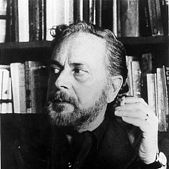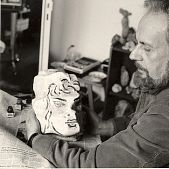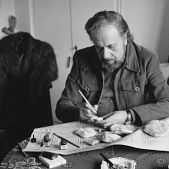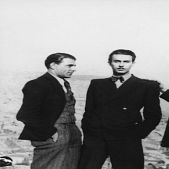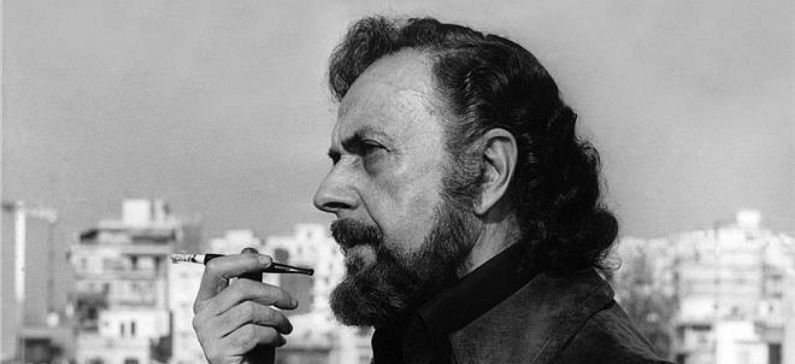
The poet of Romiossyni
Yannis Ritsos is one the leading poets of Greece, also known as the Poet of Romiossyni. His life’s work consists of 100 poem collections and compositions, 9 novels, 4 plays and several studies. Translated in 40 languages, the international publications of his work amount to 266.
Ritsos was born in Monemvasia in 1909. His father Eleftherios was a wealthy landowner. Yannis loved poetry since his early age and in 1917, at the age of 8, he wrote his first poem. His mother Eleftheria supported his talent and bought him a subscription to the magazine The Children’s Formation.
His childhood was marked by the deaths of his mother and brother by tuberculosis, while the family lost all its fortune due to the father’s problems with gambling. The financial condition of that period and also their father’s financial status forced young Yannis Ritsos and his sister to relocate to Athens in September 1925 and worked several jobs to be able to afford their basic needs.
In 1924, he debuted with his work in Children’s Formation, publishing his prose work A lesson, signing with the alias Ideal Vision. One year later, he published two more poems under the same alias. In 1926, he fell sick with tuberculosis and during recovery, he composed two poems titled Tears and Smiles and Our old home, clearly inspired by his residency at his family’s house in Monemvasia.
In 1927, he was hospitalized at Sotiria Hospital for three years. In 1930, he published several poems under the alias Y. Sostir, a common anagram of his real name. In 1934, he published Tractor his first collection of poems and started writing his column Letters to the Frontline for Rizospastis newspaper. During the same year, he joined the Communist Party of Greece and faithfully served it until his death. In 1936, he first signed three poems with the alias Kostas Eleftheriou, published in Nea Grammata magazine and later in the same year, he authored his landmark poem Epitaphios.
At the same time, Ritsos joined several performances of the National Theatre and the National Opera of Greece. In 1942, he became a member of the EAM (National Liberation Front). During Dekemvriana, his archive was destroyed and in 1945 he started authoring Romiossyni. In 1948 he was arrested and imprisoned on the island of Limnos, before being transferred to Makronisos in 1949. Except from the poems he was authoring during his exile, he also started painting. With the help of his companions, several of those years’ works were saved, like his manuscripts that were buried by actor Manos Katrakis.
In 1950, his health got worse and although he was set free, he got arrested one month later and transferred to Ai Stratis. Eventually, he returned to Athens in 1952, carrying all his poems and paintings in two suitcases.
In April 1954, Agrypnia (Vigil) was published, with Romiossyni and He Kyra ton Ambelion (The Lady of the Vineyards).
In 1966, the poem Romiossyni was published separately from the original collection. During the same year, composer Mikis Theodorakis set parts of Romiossyni to music and Grigoris Bithikotsis lent his voice to the released record.
In 1967, after the military coup of April 21st, Ritsos was arrested and exiled to Gyaros and Leros. In 1968, he was diagnosed with cancer and decided to destroy his unfinished works, being convinced that he wouldn’t have the opportunity to complete them.
The following years were rich in writing and political activism up to his eventual death.
Yannis Ritsos died on November 11th, 1990, and was buried at his hometown Monemvasia.
AWARDS
In 1956, Yannis Ritsos received the 1st State Poetry Award for his work The Moonlight Sonata. In 1972, he was honoured with the Great International Award for Poetry in Belgium and 3 years later, he received the international award Georgi Dimitrov in Bulgaria and a honourary doctorate from the Aristotle University of Thessaloniki. Later in the same year, he received the Grand Prize for Poetry Alfre De Viny in France and was nominated for the Nobel Prize. In 1976, he received the international award Etna-Taormina in Italy and in 1977 he was honoured with the Lenin Prize for Peace and with the international award Bontelo in 1978. During the same year, he received a honourary doctorate from the University of Birmingham and in 1986, he received the Peace Poetry Award by the United Nations and a medal by the National Mint of France. In March 1987, he received a honourary doctorate by the Kapodistrian University of Athens and the Mayor of Athens honoured him with the city’s Gold Medal of Honour. In 1990, Ritsos received the Joliot-Curie Award, the highest distinction by the World Peace Council.
TIPS...
– His work was banned, during his exile years. However, he never stopped writing and his works were spread in all kinds of clandestine ways.
– Metaxas dictatorship listed Epitaphios among the subversive books that were burned in a bonfire at the Temple of Olympian Zeus in Athens.
– Shocked by the news about the execution of Belogiannis, he wrote the poem The Man with the Carnation, while in exile. His exile fellows copied the poem on cigarette papers and illegally sent it to Romania where it later got published.
QUOTES...
Don’t cry for Romiossyni
Just as it is about to bend down
With a knife in the bone
With a belt on the neck
Look, it jumps up from the start
And grows stronger and furious
And hits the beast
With a harpoon of the sun.




